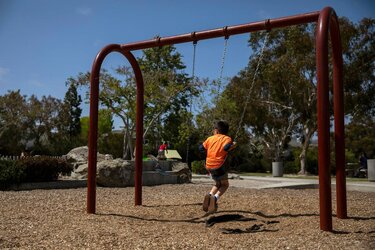
Researchers say that societal factors — like rising child care costs, unaffordable housing and slipping optimism about the future — have made it harder to raise children in the United States.
By Teddy Rosenbluth
Published July 31, 2024
For years, some conservatives have framed the declining fertility rate of the United States as an example of eroding family values, a moral catastrophe in slow motion.
JD Vance, the Republican vice-presidential nominee, recently came under fire for saying in 2021 that the nation was run by “childless cat ladies” who “hate normal Americans for choosing family over these ridiculous D.C. and New York status games.”
Last year, Ashley St. Clair, a Fox News commentator, described childless Americans this way: “They just want to pursue pleasure and drinking all night and going to Beyoncé concerts. It’s this pursuit of self-pleasure in replace of fulfillment and having a family.”
Researchers who study trends in reproductive health see a more nuanced picture. The decision to forgo having children is most likely not a sign that Americans are becoming more hedonistic, they say. For one thing, fertility rates are declining throughout the developed world.
Rather, it indicates that larger societal factors — such as rising child care costs, increasingly expensive housing and slipping optimism about the future — have made it feel more untenable to raise children in the United States.
“I don’t see it as a lack of a commitment to family,” said Mary Brinton, a sociologist who studies low fertility rates at Harvard. “I think the issues are very much on the societal level and the policy level.”
To some extent, experts like Dr. Brinton share the concern that Americans are having less children.
Fertility rates have been generally falling in the United States since the end of the baby boom in the mid-1960s. That decline accelerated after 2008, a trend that has been widely attributed to the Great Recession, said Kenneth Johnson, a demographer at the University of New Hampshire.
“Everybody thought, maybe they’ll just delay having their babies for a few years, and then they’ll make up for it when the economy and the country gets back on its feet,” he said. “It never happened.”
Last year, the total fertility rate dipped to 1,616.5 births per 1,000 women, a historic low that is far less than the rate needed to maintain the population size, 2,100 births per 1,000 women.
A recent survey by the Pew Research Center found that a growing number of adults said they were unlikely to ever have children. Even before the Covid-19 pandemic, nearly half of U.S. counties reported more deaths than births.
In addition, the average age at which Americans are marrying and starting to have children has increased, most likely contributing to the fertility decline. In 2023, the median age of women who were marrying for the first time was 28 — about six years older than in the 1980s.
The average age when women give birth to their first child has also risen substantially, from age 20 during the baby boom to 27 in 2022.
Immigration to the United States helps offset population loss. Yet experts fear that shrinking generations could cause schools to close, economic development to stall and social programs like Social Security to run an even larger deficit.

JD Vance, the Republican vice-presidential nominee, has proposed tax breaks and more voting power for parents. But experts say there is little evidence to suggest that policies rewarding people for having children are successful on their own.
Notably, studies of the reasons behind the fertility decline don’t reveal a dramatic shift in the desire to have children.
Many Americans in their teens and 20s still report that they want two children, said Sarah Hayford, the director of the Institute for Population Research at Ohio State University. The fact that many of those adults don’t realize those goals probably means that external factors are making it more difficult to be a parent, she said.
Survey data suggests that many young adults want to hit certain economic milestones before having children — they might want to buy a house, pay off student debt or comfortably afford child care, said Karen Benjamin Guzzo, a family demographer at the University of North Carolina at Chapel Hill.
Reaching those milestones has become increasingly difficult, she said, as mortgage rates have risen sharply and child care costs have soared.
As fewer women opt to stay home to raise children, the absence of policies that support working families — like paid maternity leave and stable child care — may also be leading couples to believe they’re not prepared to be parents, Dr. Guzzo added.
The decision to have children, which she views as the “ultimate vote of confidence” in the future, may also be affected by how optimistic people are about the state of the world, she said.
A study by sociologists in the Netherlands found that people who said they thought the future generation’s prospects were “much worse than today” were less likely to become parents.
Right now, there are plenty of reasons young Americans might be pessimistic, Dr. Guzzo said, including climate change, frequent gun violence and the recent pandemic.
This might explain why fertility rates have been declining in most developed countries — not just in the United States — despite differences in their economic systems and social welfare policies.
“It’s not about being selfish and saying, ‘I’m not having kids because I want to sleep in all the time,’” Dr. Guzzo said. “When fertility rates are down, to me, that’s because people don’t feel like they have a future that they feel confident in.”
If there has been any shift in attitudes toward parenthood, Dr. Hayford of Ohio State said she believed that younger Americans were now more focused on whether they could offer a child “the best experience possible.”
In interviews she conducted with teenagers and adults in their early 20s, Dr. Hayford said, they often stressed the importance of improving their own patience and anger management to ensure they would be able to one day support their children’s emotional needs.
And some research suggests that younger generations have a higher bar for the amount of money required to raise a child.
“Having children is something that people feel like they can make a choice about,” Dr. Hayford said. “They are really reluctant to enter into parenthood if they can’t provide what they think children need.”
Exactly how to change the trajectory of a so-called baby bust is still a mystery. Last year, former President Donald J. Trump floated the idea of offering a “baby bonus” to incentivize more families to have children.
“I want a baby boom!” he told a crowd of supporters. “You men are so lucky out there.”
Mr. Vance, his running mate, has advocated tax breaks for households with children and even an altered election system in which parents would have more voting power than people without children.
There is little evidence to suggest that policies designed to reward people for having children are successful on their own, Dr. Guzzo said. Governments in some countries have tried to increase fertility rates with cash incentives, tax breaks and generous parental leave, yielding modest or no success.
Since declining fertility is the result of a range of societal problems, Dr. Guzzo said, legislation that addresses broader issues — like student loans, unaffordable housing and parental leave — is more likely to spur change.
“In our view, every policy is a family policy,” she said.
A correction was made on Aug. 1, 2024: An earlier version of this article misstated the total fertility rate in 2023 and the replacement rate. The figures are 1.6 and 2.1 births per woman, not per 1,000 women.